
Richard Nathaniel Wright was an American author of novels, short stories, poems, and non-fiction. Much of his literature concerns racial themes, especially related to the plight of African Americans during the late 19th to mid 20th centuries suffering discrimination and violence. His best known works include the novella collection Uncle Tom's Children (1938), the novel Native Son (1940), and the memoir Black Boy (1945). Literary critics believe his work helped change race relations in the United States in the mid-20th century.
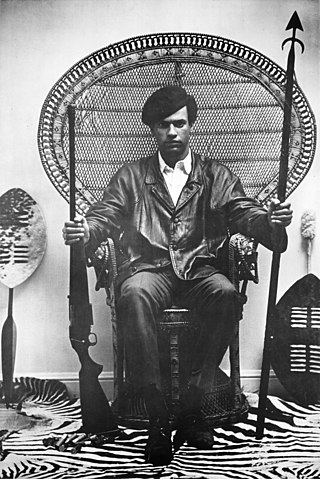
Huey Percy Newton was an African American revolutionary and political activist who founded the Black Panther Party. He ran the party as its first leader and crafted its ten-point manifesto with Bobby Seale in 1966.
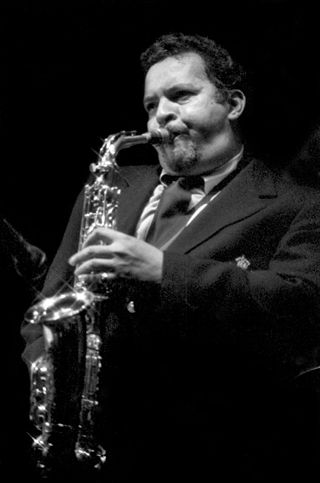
John Lenwood McLean was an American jazz alto saxophonist, composer, bandleader, and educator, and is one of the few musicians to be elected to the DownBeat Hall of Fame in the year of their death.

David Ernest McReynolds was an American politician and social activist who was a prominent democratic socialist and pacifist activist. He described himself as "a peace movement bureaucrat" during his 40-year career with the War Resisters League. He was a resident of New York City. McReynolds was twice a candidate for President of the United States, running atop the ticket of the Socialist Party USA in 1980 and 2000. He was America's first openly gay presidential candidate.
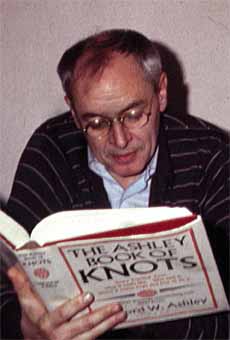
Ronald David Laing, usually cited as R. D. Laing, was a Scottish psychiatrist who wrote extensively on mental illness—in particular, psychosis and schizophrenia. Laing's views on the causes and treatment of psychopathological phenomena were influenced by his study of existential philosophy and ran counter to the chemical and electroshock methods that had become psychiatric orthodoxy. Laing took the expressed feelings of the individual patient or client as valid descriptions of personal experience rather than simply as symptoms of mental illness. Though associated in the public mind with the anti-psychiatry movement, he rejected the label. Laing regarded schizophrenia as the normal psychological adjustment to a dysfunctional social context, although later in life he revised his views.

David Graham Cooper was a South African-born psychiatrist and theorist who was prominent in the anti-psychiatry movement.
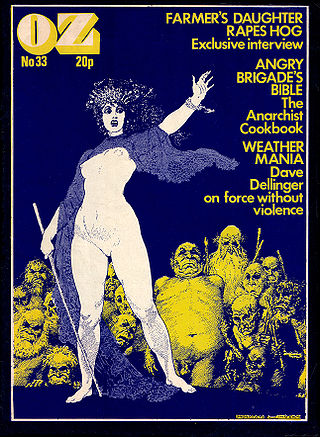
The terms underground press or clandestine press refer to periodicals and publications that are produced without official approval, illegally or against the wishes of a dominant group. In specific recent Asian, American and Western European context, the term "underground press" has most frequently been employed to refer to the independently published and distributed underground papers associated with the counterculture of the late 1960s and early 1970s in India and Bangladesh in Asia, in the United States and Canada in North America, and the United Kingdom and other western nations. It can also refer to the newspapers produced independently in repressive regimes. In German occupied Europe, for example, a thriving underground press operated, usually in association with the Resistance. Other notable examples include the samizdat and bibuła, which operated in the Soviet Union and Poland respectively, during the Cold War.
A teach-in is similar to a general educational forum on any complicated issue, usually an issue involving current political affairs. The main difference between a teach-in and a seminar is the refusal to limit the discussion to a specific time frame or a strict academic scope. Teach-ins are meant to be practical, participatory, and oriented toward action. While they include experts lecturing on their area of expertise, discussion and questions from the audience are welcome, even mid-lecture. "Teach-ins" were popularized during the U.S. government's involvement in Vietnam. The first teach-in, which was held overnight at the University of Michigan in March 1965, began with a discussion of the Vietnam War draft and ended in the early morning with a speech by philosopher Arnold Kaufman.

Naphtali "Tuli" Kupferberg was an American counterculture poet, author, singer, cartoonist, publisher, and co-founder of the rock band The Fugs.
Lee Raymond Baxandall was an American writer, translator, editor, and activist. He was first known for his New Left engagement with cultural topics and then as a leader of the naturist movement.
Tenafly High School is a four-year comprehensive community public high school in Tenafly in Bergen County, in the U.S. state of New Jersey, serving students in ninth through twelfth grades as the lone secondary school of the Tenafly Public Schools. Students from the neighboring community of Alpine attend the school as part of a sending/receiving relationship with the Alpine Public School.

The counterculture of the 1960s was an anti-establishment cultural phenomenon and political movement that developed in the Western world during the mid-20th century. It began in the early 1960s, and continued through the early 1970s. It is often synonymous with cultural liberalism and with the various social changes of the decade. The effects of the movement have been ongoing to the present day. The aggregate movement gained momentum as the civil rights movement in the United States had made significant progress, such as the Voting Rights Act of 1965, and with the intensification of the Vietnam War that same year, it became revolutionary to some. As the movement progressed, widespread social tensions also developed concerning other issues, and tended to flow along generational lines regarding respect for the individual, human sexuality, women's rights, traditional modes of authority, rights of people of color, end of racial segregation, experimentation with psychoactive drugs, and differing interpretations of the American Dream. Many key movements related to these issues were born or advanced within the counterculture of the 1960s.
Calvin Coolidge Hernton was an American sociologist, poet and author, particularly renowned for his 1965 study Sex and Racism in America, which has been described as "a frank look at the role sexual tensions played in the American racial divide, and it helped set the tone for much African-American social criticism over the following decade."
Bradford Lyttle is an American pacifist and peace activist. He was an organizer with the Committee for Non-Violent Action of several major campaigns against militarism, including "Omaha Action", against land-based nuclear missiles (1959) and "Polaris Action" against submarine-based nuclear missiles (1960). Lyttle and several others walked from San Francisco to New York City, and then through parts of Europe to Moscow, Russia, from December 1960 until late 1961. The action was called the San Francisco to Moscow March for Peace. Several participants, including Lyttle, walked the entire distance. He also walked in the Quebec-Washington-Guantanamo Peace Walk (1963).

The Black Panther Party was a Marxist–Leninist and black power political organization founded by college students Bobby Seale and Huey P. Newton in October 1966 in Oakland, California. The party was active in the United States between 1966 and 1982, with chapters in many major American cities, including San Francisco, New York City, Chicago, Los Angeles, Seattle, and Philadelphia. They were also active in many prisons and had international chapters in the United Kingdom and Algeria. Upon its inception, the party's core practice was its open carry patrols ("copwatching") designed to challenge the excessive force and misconduct of the Oakland Police Department. From 1969 onward, the party created social programs, including the Free Breakfast for Children Programs, education programs, and community health clinics. The Black Panther Party advocated for class struggle, claiming to represent the proletarian vanguard.

Alexander Demitri "Alex" Shimkin was an American war correspondent who was killed in Vietnam. He is notable for his investigation of non-combatant casualties in Operation Speedy Express.
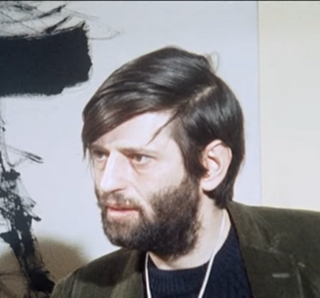
Allen Martin Krebs was an American sociology professor and Marxist educationalist known for co-founding the Free University of New York and the Antiuniversity of London.
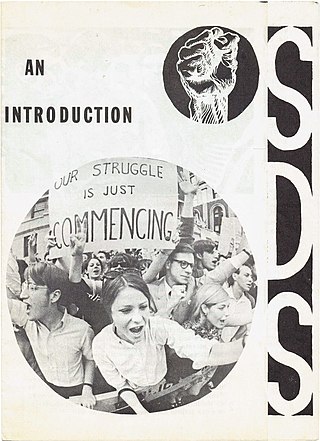
Students for a Democratic Society (SDS) was a national student activist organization in the United States during the 1960s and was one of the principal representations of the New Left. Disdaining permanent leaders, hierarchical relationships and parliamentary procedure, the founders conceived of the organization as a broad exercise in "participatory democracy". From its launch in 1960 it grew rapidly in the course of the tumultuous decade with over 300 campus chapters and 30,000 supporters recorded nationwide by its last national convention in 1969. The organization splintered at that convention amidst rivalry between factions seeking to impose national leadership and direction, and disputing "revolutionary" positions on, among other issues, the Vietnam War and Black Power.

The Antiuniversity of London was an anti-establishment, alternative education project founded in London in February 1968. Established as a "free university", it was initially based at 49 Rivington Street in Shoreditch; a building owned by the Bertrand Russell Peace Foundation which had previously been used by the Vietnam Solidarity Campaign.

Sharon L. Krebs was an American political activist, member of the feminist group W.I.T.C.H, and co-founder of the Free University of New York. In 1971 she was convicted of second-degree conspiracy for attempting to firebomb a bank in New York City as part of a Weather Underground plot.















